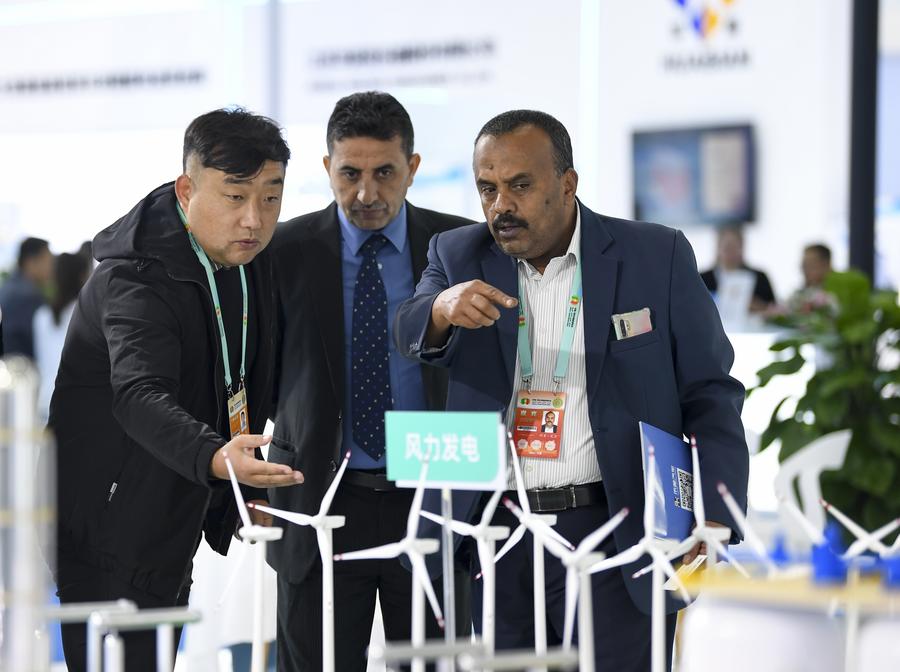
A guest (R) learns about a wind power generation project at the sixth China-Arab States Expo in Yinchuan, northwest China's Ningxia Hui Autonomous Region, Sept. 22, 2023. (Xinhua/Feng Kaihua)
The China-Arab partnership has become a model of South-South cooperation, a stable anchor in turbulent times.
CAIRO, May 28 (Xinhua) -- In ancient times, China shimmered as a mythical and distant land in Arab folklore and fairy tales.
For instance, the famous tale of Aladdin in "Arabian Nights" was actually set in China, whose remoteness from Arab lands lends an exotic allure to the narrative.
Fast forward to the 21st century, the once-mythical China has stepped out of "Arabian Nights" and into the everyday life of millions of Arabs.
Cairo's lively streets have witnessed an increasing presence of Chinese automobiles, while a fleet of Chinese electric buses served as the backbone of public transportation during the 2022 World Cup in Doha. Landmarks such as Algeria's Grand Mosque and Kuwait's Central Bank headquarters showcase the work of Chinese construction firms. Chinese electronics and appliances have become familiar fixtures in Arab households, seamlessly integrated into their daily life.
This transformation is rooted in decades of China-Arab friendly ties, especially since 2004, when the China-Arab States Cooperation Forum was established. During the past 20 years, both sides have deepened political mutual trust, strengthened economic and trade cooperation as well as cultural and people-to-people exchanges, yielding fruitful outcomes.
Political trust has always served as the bedrock of China-Arab cooperation. China has always tried to promote peace and stability in bilateral ties. Last year, China brokered a historic reconciliation between Saudi Arabia and Iran, a move that not only helped ease tensions within the region but also catalyzed a wave of reconciliations among Arab states and within the broader region.
After the latest Israeli-Palestinian conflict erupted last October, China has been calling for a ceasefire, speeding up humanitarian aid, and a lasting, just solution to the Palestinian question.
The Arab nations have always upheld the one-China principle and backed China's efforts to safeguard its territorial integrity.
The 1st China-Arab States Summit took place in 2022, during which both sides committed to building a closer partnership for the future, opening a new chapter in China-Arab relations.
Bilateral trade has also witnessed a meteoric rise, surging from 36.7 billion U.S. dollars in 2004 to a staggering 398 billion dollars in 2023. The impressive growth has cemented China's position as the Arab world's undisputed top trading partner for many years.
China has signed Belt and Road cooperation agreements with all 22 Arab nations. This framework has yielded over 200 large-scale projects, benefiting nearly 2 billion people from both sides.
Cultural exchanges have been flourishing, with increasingly deepened cooperation in language learning and education, and frequent bilateral cultural events. While more and more Chinese students are coming to Arab countries to learn the language and culture, Saudi Arabia, the United Arab Emirates, Egypt, Tunisia and other countries have announced that the Chinese language will be included in their national education systems. There are more than 20 Confucius Institutes in Arab countries and hundreds of schools offering Chinese courses.
Mutual perceptions between the two populations are evolving positively. A 2023 poll conducted by a Dubai-based company shed light on a growing trend: Arab youths increasingly regard China as a close partner. Surveying 3,600 young Arabs across 18 nations, the poll revealed that 80 percent consider China as a close friend, deeming it as their most trusted nation.
The China-Arab partnership has become a model of South-South cooperation, a stable anchor in turbulent times. As both sides are scheduled to meet in Beijing Thursday for the 10th ministerial conference of the China-Arab States Cooperation Forum, they are expected to draw up a new blueprint for strengthening bilateral relations in various fields to further promote the building of a China-Arab community with a shared future in the new era.